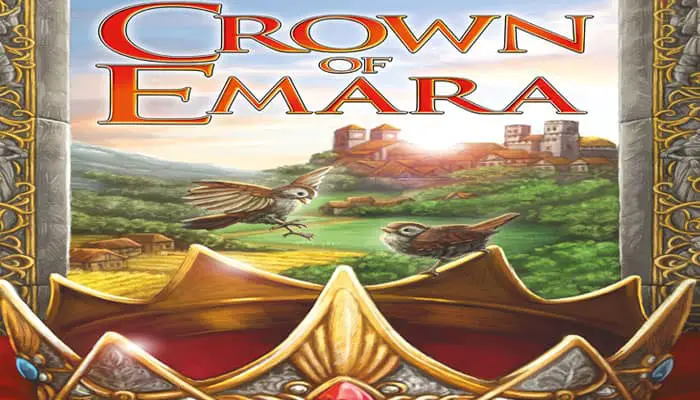
Components

- 1 Scoring Track
- 4 "Countryside" Locations
- 4 "Town" Locations
- 1 Game Board "Nobility"
- 4 Player Boards
- 16 Books
- 12 Signet Rings
- 12 Gold Coins
- 12 Breads
- 12 Favor Tokens
- 4 Donation Markers
- 1 Statue
- 36 Action Cards
- 20 Nobility Cards
- 14 Event Cards
- 22 Advisor Cards
- 4 Turn Overviews
- Resources
- 16 Craftsmen
- 8 Councilors
- 4 Citizens
- 4 Buildings
Setup

1 The Countryside: Randomly combine the 4 Countryside Locations (Forest, Grainfield, Quarry, Weaving Mill)
2 Place the 4 kinds of resources on the corresponding locations (Wood, Grain, Stone, Cloth). Place the Breads on the Grainfield.
3 The Town: Randomly combine the 4 Town Locations (Castle, Cathedral, Construction Site, Market).

4 Castle: Place the Signet Rings on the designated space.
Turn the 4 Gift Markers to the appropriate side for your number of players. Place them on the designated spaces with the black number facing the resource.
Exception for 2 players: Rotate the markers for Stone and Cloth, so that the "2" faces the resources.

5 Cathedral: Shuffle the Favor Tokens to form a face down stack. Place the Books nearby.
Turn the 4 Donation Markers to the appropriate side for your number of players. Place them on the designated spaces with the black number facing the resource.
Exception for 2 players: Rotate the markers for Wood and Grain, so that the "2" faces the resources.

6 Market: Place the Gold Coins on the designated space

7 Construction Site: Turn the Bread Marker and Stone Marker to the appropriate side for your number of players. Place them on the designated spaces with the black number facing the Stone and Bread symbols.
Exception for 2 players: Rotate both markers clockwise, to the next number.

8 Advisors: Shuffle all Advisor Cards A (see image) and place 8 of them randomly on the designated spaces on the Town Locations (i.e. 2 per Location). Return the rest to the game box.

9 Shuffle all Advisor Cards B (see image) and place them as a face up stack next to the game boards.
10 Sort and stack the Nobility Cards according to their title. Sort each stack by Citizen Point value in descending order. Place the stacks on the Nobility Board.
11 Place the two-piece Scoring Track next to the other game boards.
12 Shuffle the Events and place them as a face up Event Deck on the table.
13 Take 1 Player Board and 1 Turn Overview, each. Also take your other game materials: 8 wooden components (4 Craftsmen, 1 Citizen, 2 Councilors, 1 Building) and 9 Actions Cards (1 of each type).

14 Place your Citizens on the "0" on the Scoring Track. Place your Buildings on the number indicated by the top card of the Event Deck.
Exception: Place your buildings on "35" if playing for the first time. The lower the number, the harder the game. You can also decide on the starting space of your buildings..
15 Place your Craftsmen on the indicated spaces of your Player Board.
16 Randomly select a starting player. They take the Statue and place their Councilors on the Locations indicated by the top card of the Event Deck:

Clockwise, all other players place their Councilors on the Locations following in clockwise order. Take 1 resource corresponding to the location of your Councilor in the Countryside.
Note: Both figures serve the same roles.
17 Shuffle your 9 Action Cards and place them as a face down stack next to your Player Board. Draw the top 3 cards.
General Notes
Double-sided Cards

All cards, except for Action Cards, are printed with English on the front and German on the back, specified by white (German) or black (English) borders. Before playing, simply turn them to the appropriate side.
Double-sided Locations

For purely cosmetic reasons, all Locations are printed with either a lighter or darker background. Choose which one you like better and turn all Locations to the respective side.
Rules depending on the number of players
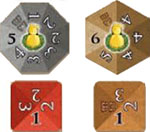
In addition, there is only 1 rule that depends on the number of players.
During setup, placing of Donation, Gift, Stone, and Bread Markers on the Castle, Cathedral, and Construction Site Locations (steps 4, 5, and 7 of the setup) varies.
One side of each of the markers shows the following symbol: 
Use that side in 2- and 3-player games. Otherwise, use the other side.
Unlimited Game Components
There is no limit to how many Resources, Breads, Books, Signet Rings and Gold Coins you may have. If you, unexpectedly, run out of the given resource, please use an appropriate replacement.
Game Play
In Crown of Emara you each aim to satisfy as many citizens as possible. The Citizen tracks your current Citizen Points on the Scoring Track.
However, at the end of the game, all your citizens need housing to be content. Correspondingly, your Building tracks the current Building Points on the Scoring Track.
So, to win the game, you need to mind both, the number of citizens and their housing. Finally, your score will be the lower of Building and Citizen Points and the player with the highest final score wins.
Throughout the game, you will perform different actions:
On the one hand, Action Cards will provide you with resources and a variety of other actions.

On the other hand, playing Action Cards always triggers movement and an action of 1 of your Councilors. Movement and actions in the Countryside will give you further resources that you can spend in Town.
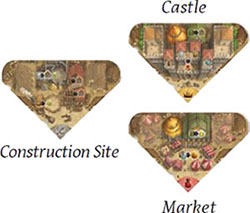
You can also use collected resources for Bonus Actions: to hire Craftsmen, to recruit Advisors, or to increase your noble rank. The former two provide support throughout the game, whereas the latter increase your reputation and attracts citizens.
There are several ways to collect Points.
You receive Building Points for delivering Stone and Wood to the Construction Site. You can also collect Building Points for spending Books in the Castle and thanks to some Advisors.
You receive Citizen Points for delivering Bread or Stone to the Construction site. You can also receive Citizen Points by increasing your noble rank, by donating Books on the Market, and thanks to some Advisors.
Course of the Game
Crown of Emara is played over 6 rounds, in which each player takes 3 turns. Each round has the following phases:
-
Event
Return the topmost card of the Event Deck to the game box. Announce the new top card to all players and apply its effect. Some Event cards have an effect at the end of the round (see below).
The Events are explained in detail on page 10, "Event Cards".
-
Player Turns

Beginning with the Starting Player, take turns in clockwise order.
On your turn, play 1 Action Card from your hand onto an empty slot of your Player Board. Then perform the associated Card Action, Movement Action and up to 3 different Bonus Actions in the order of your choice.
The actions are explained in detail on the next page, "A Player's Turn".
-
End of the Round
The round ends after each player has taken 3 turns, i.e. after they have played all their 3 Action Cards:
- If the current Event refers to the end of the round, apply its effect.
- Pass the Statue to the next player, in clockwise order.
- Flip the 3 Action Cards played this round to "empty" the slots of your Player Board.
- If this is the end of the 3rd round, shuffle all 9 Action Cards to create a new stack.
- Draw 3 Action Cards.
After 6 rounds, the game is over. Continue with the end game scoring and determine the winner.
A Player's Turn
Play 1 Action Card from your hand onto any empty slot of your Player Board.
The Card determines which Card Action you take. The slot determines your Movement Action, i.e. the amount of steps (1, 2, or 3) that you move 1 of your Councilors.
You may also perform each of the 3 Bonus Actions 1x, if you can pay the associated costs. You may perform all these actions in any order but you must finish each action before starting the next.
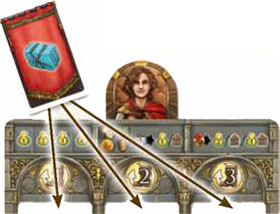
Card Action
Perform the action shown on the Action Card you just played:
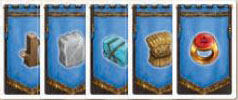
Take 1 Wood/1 Stone/1 Cloth/1 Grain/1 Signet Ring.

You may pay 1 resource to take 1 Gold Coin OR pay any 3 resources to take 2 Gold Coins.

Move 1 of your Councilors to the next location in clockwise order (1 step). You may perform the action associated to that Location.
Note: This action is identical to a Movement Action that allows 1 step (see below).

You may perform the Bonus Action "Hire a Craftsman" or "Recruit an Advisor" at a Location where 1 of your Councilors is present. Pay any 1 resource less than required.
Note: The Bonus Actions are explained in detail on page 7, "Bonus Actions".

You may perform the action associated to any Town Location (Castle, Cathedral, Construction Site, Market) irrespective of your Councilors positions.
Note: The Town Locations and their actions are explained in detail on the next page, "Town Location Actions".
Movement Action
Move 1 of your Councilors as many steps in clockwise order to a new Location, as indicated on the slot to which this turn's Action Card was played (1, 2, or 3 steps). You may not move less!
There is no limit to the number of Councilors on a Location. You may then perform the action associated to that Location. The Locations and their actions are explained in the following sections.
Countryside Location Actions
Weaving Mill, Grainfield, Quarry, Forest
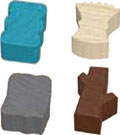
Take 1 resource indicated on the Location: 1 Cloth, 1 Grain, 1 Stone, or 1 Wood.
Additionally, for each of your Craftsmen on the Location, you may choose to either: Take 1 additional resource of the same type OR
Pay 1 Grain to take 1 Bread.
Town Location Actions
Cathedral

You may make 1 donation: Choose which kind of resource you want to donate. Pay the number of resources currently indicated by the corresponding marker. Then, turn that marker clockwise to the next number.
You receive 2 rewards for the donation:
-
Take 1 Book
 .
.Note: Books represent knowledge. Books can be used to obtain Building Points in the Castle or Citizen Points on the Market.
-
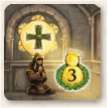
You also receive 1 Favor Token: Take 3 Favor Tokens from the stack and look at them.
Place 1 of them face up next to your Player Board to keep it. Discard the other 2 to a face up discard pile. If at any time the Favor Token stack is empty, shuffle the discard pile and place it as a new face down stack.
If your Councilor finishes its movement on a Location indicated by 1 or more of your favor Tokens or if you perform its Action, you may discard any or all of these Tokens to receive the indicated reward(s).
Castle

2 Actions are available in the Castle. You may perform each Action 1x.
You may make 1 gift to the king: Choose which kind of resource you want to give. Pay the number of resources as currently indicated by the corresponding marker. Then, turn that marker clockwise to the next number*.
You receive a reward for the gift: Take 1 Signet Ring.
Note: Signet Rings represent your influence on the King. They can be used to increase your noble rank and for several Events.

Discard 1 Book to receive 5 Building Points.
Market

2 Actions are available on the Market. You may perform each Action 1x. Pay any 1 resource to take 1 Gold Coin  . Whenever you pay 1 resource, you may always discard 1 Gold Coin, instead.
. Whenever you pay 1 resource, you may always discard 1 Gold Coin, instead.
Note: Gold Coins can be used to increase your noble rank.
Discard 1 - 5 Books to receive citizen points according to the following table:

Construction Site

3 Actions are available at the Construction Site. You may perform each Action 1x.
-
Pay 1 stone to receive 5 building points and a number of citizen points as currently indicated by the stone marker. Then, turn that marker clockwise to the next number.
-
Pay 1 - 3 breads to receive a number of citizen points for each as currently indicated by the bread marker. Then, turn that marker clockwise to the next number.
-
Pay 1 or 3 wood to receive building points:
- For 1 Wood you receive 5 Building points.
- For 3 Wood you receive 10 Building points.
Note: If you would turn a marker on the castle, cathedral, or construction site to the black number or the symbol indicating the player number, return it to the game box, instead. Until the end of the game, use the value printed on the board.
Bonus Actions
In addition to your Card and Movement Action, you may perform each of the 3 available Bonus Actions 1x at any time during your turn. You must be able to pay the costs to do so.
-
Bonus Action: Increase your noble rank

Nobility Cards are a good source of Citizen Points. The cards correspond to 5 noble ranks that each player can acquire once during the game in the following order: Baron, Count, Prince, Marquess, Duke. You may not skip a rank.
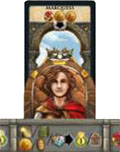
To increase your noble rank, discard the indicated number of Gold Coins and Signet Rings of the next rank and take the topmost card of its stack.
Receive Citizen Points as indicated on the Nobility Card and place it underneath your Player Board (see image to the right).
-
Bonus Action: Hire a Craftsman

Craftsmen increase your income from a Countryside Location.
To Hire a Craftsman, first choose an empty hut on your Councilor's current Countryside Location. Pay the resource cost indicated on the hut to place the leftmost Craftsmen from your Player Board on it.

Immediately receive Citizen Points as indicated underneath the Craftsman on your Player Board.
Note: You may place up to 3 Craftsmen on the same Location.
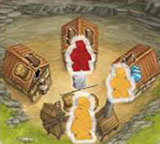
Note: Yellow wants to Hire a Craftsman. The hut showing 2 Wood is already occupied, so they choose the hut showing 1 Wood and 1 Cloth, pay the cost and place the Craftsman.
They receive 1 Citizen Point, as it was their first Craftsman.
-
Bonus Action: Recruit an Advisor

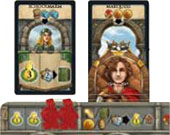
To Recruit an Advisor, first choose an Advisor on your Councilor's current Town Location.
Then, pay the resources indicated on the top of the Advisor Card to place it to the left of your portrait on your Player Board (see image to the right).
As long as possible, refill the empty space on the Town Location by placing the topmost Advisor from the prepared stack of Advisor B Cards.
Immediately receive Citizen Points as indicated on the bottom left of the Advisor Card. Some Advisors give you an additional, immediate bonus; others grant special abilities for the rest of the game.
End of the Game
The game ends after 6 rounds, when each player has played all their Action Cards twice. Then continue with the end game scoring:
Receive 2 points for each Signet Ring you own. Receive 1 point for each Gold Coin, Favor Token, Book, Bread, and for every 2 resources you have left. You may use these points as Citizen or Building Points or any combination thereof. Move Citizen and Building, accordingly.
Determine your final score by comparing your Building and Citizen Points. The lower of the two is your final score.
The player with the highest final score wins.
In case of a tie, apply the following rules to determine who of those players is in the lead:
- who scored more points with the second marker (Citizen or Building),
- who has the highest noble rank,
- who scored more Citizen Points from their Nobility Card of their highest rank.
If there is still a tie, all of those players share the position.
Variants
If you are familiar with the Crown of Emara base game, you can use the following variants to add more variety to the game.
-
Random Location Layout: During setup, instead of sorting the locations into countryside and town, shuffle all 8 locations and create 2 random boards with 4 locations each.
Each player takes 1 resource of their choice, irrespective of the councilors position.
Note: If the starting player's Councilors would both be placed onto the same set of Locations during Setup, they relocate one of them of their choice to any Location of their choice on the other set.
Then, place all other players' Councilors, as usual.
-
Full Selection: During setup, draw all 9 action cards, instead of 3. After 3 Rounds, return all cards back to your hand.
Note: This variant is much more strategic and will likely increase the duration of rounds and the game.
We recommend trying it in a 2-player game or in Solo Mode, first.
Continue Reading
